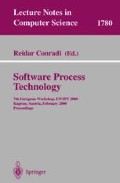Abstract
Process support environments (PSEs) are widely used for modelling, enacting and analyzing human intensive processes. The benefits of a PSE become apparent when processes to be supported are long lived and distributed and contain heterogeneous components. Generally, such processes are subject to dynamic evolution, i.e. they have to be changed during their execution. Unfortunately, virtually none of the existing PSEs consider dynamic evolution of processes. This article explains the concepts and techniques underlying a set of components developed in the ESPRIT Project Process Instance Evolution (PIE) that support the dynamic evolution of processes. These concepts and techniques are demonstrated using a real-world scenario from the automotive industry.
Preview
Unable to display preview. Download preview PDF.
References
Allen, A.O.: Probability, Statistics, and Queueing Theory. Academic Press, New York San Francisco London (1978)
Alloui, I., Cimpan, S., Oquendo, F., Verjus, H.: Tuning a Fuzzy Control System for Software Intensive Processes via Simulations. Proceedings of the IASTED International Conference on Modeling and Simulation, Philadelphia PA, USA, May 5–8 (1999)
Alloui, I., Cimpan, S., Oquendo, F., Verjus, H.: A Fuzzy Sets based Mechanism Allowing the Tuning of a Software Intensive Processes Control System via Multiple Simulations. Proceedings of the AMSE International Conference on Modelling and Simulation MS'99, Santiago de Compostela, May 17–19 (1999)
Arrow, K.J.: Social Choice and Individual Values, Wiley, New York (1963)
Basili, V.R., Caldiera, G., Rombach, H.D.: The Goal Question Metric Approach. Encyclopedia of Software Engineering, Wiley (1994)
Bouchon-Meunier, B.: La logique Floue et ses applications. Addison Wesley France, ISBN: 2-87908-073-8, Paris, France (1995)
Bradac, M., Perry, D.P., Votta, L.G.: Prototyping a Process Monitoring Experiment. IEEE Transactions on Software Engineering, vol. 20, no. 10 (1994)
Cimpan, S., Alloui, I. Oquendo, F.: Process Monitoring Formalism. Technical Report D3.01, PIE LTR ESPRIT Project 34840 (1999)
Cimpan, S., Oquendo, F.: On the Application of Fuzzy Sets Theory on the Monitoring of Software-Intensive Processes. Proceedings of the Eight International Fuzzy Systems Association World Congress IFSA'99, Taipei, Taiwan (1999)
Cimpan, S., Oquendo, F.: Fuzzy Indicators for Monitoring Software Processes. Proceedings of the 6th European Workshop on Software Process Technology EWSPT'98, Springer Verlag, London, UK (1998)
Cook, J., Wolf, A.L.: Toward Metrics for Process Validation. 3rd International Conference on the Software Process, Reston, Virginia, USA (1994)
Cook, J.E., Wolf, A.L.: Software Process Validation: Quantitatively Measuring the Correspondence of a Process to a Model. ACM Transactions on Software Engineering and Methodology 8 (2) (1999) 147–176
Cunin, P.Y., The PIE project: An Introduction, accepted for EWSPT'7 (2000)
Cunin, P.Y., Dami, S., Auffret J.J.: Refinement of the PIE Workpackages. Technical Report D1.00, PIE LTR ESPRIT Project 34840 (1999)
Feiler, P.H., Humphrey, W.S.: Software Process Development and Enactment: Concepts and Definitions. Proceedings of the Second International Conference on the Software Process, February 25–26, Berlin, Germany (1993), 28–40
Fenton, N.E.: Software Measurement: A Necessary Scientifiec Basis. IEEE Transactions on Software Engineering, vol. 20, no. 3, pp. 199–206, mars (1994)
Fishburn, P.C., Foundations of Risk Management: Risk as a Probable Loss. Management Science 30 (1984) 396–406
Greenwood, M., Robertson, I. and Warboys, B.: A Support Framework for Dynamic Organizations, accepted for EWSPT'7 (2000)
Guth, V., Oberweis, A.: Delta-Analysis of Petri Net based Models for Business Processes. In: Kovács, E., Kovács, Z., Csertö, B., Pépei, L. (eds): Proceedings of the 3rd International Conference on Applied Informatics (Eger-Noszvaj, Hungary, August 24–28) (1997) 23–32
Hapner, M., Burridge, R., Sharma, R.: Java Message Service™. Sun Microsystems, Java Software, Version 1.0.1, October (1998)
Humphrey, W.S.: Characterising the Software Process: A maturity framework. IEEE Software, 5(2) (1988) 73–79
Iida, H., Mimura, K., Inoue, K., Torii, K.: Hakoniwa: Monitor and Navigation System for Cooperative Development Based on Activity Sequence Model. Proceedings of 2nd International Conference on Software Process, Los Alamitos, California, IEEE CS Press (1993)
Jorion, P.: Value at Risk: A New Benchmark for Measuring Derivatives Risk. Irwin Professional Publishing, Chicago (1997)
Lonchamp, J.: A Structured Conceptual and Terminological Framework for Software Process Engineering. Proceedings of the Second International Conference on the Software Process, February 25–26, Berlin, Germany (1993), 41–53
Luce, R.D., Several Possible Measures of Risk. Theory and Decision 12 (1980) 217–228
Moskowitz, H., Bunn, D.: Decision and Risk Analysis. European Journal of Operational Research 28 (1987) 247–160
von Neumann, J., Morgenstern, O.: Theory of Games and Economic Behaviour. Princeton University Press, Princeton (1947)
PIE Consortium: Process Instance Evolution. Technical Report Annex 1, PIE LTR ESPRIT Project 34840 (1998)
Pratt, J., Risk Aversion in the Small and in the Large. Econometrica 32 (1964) 122–136
Ramsey, F.P.: Truth and Probability, The Foundations of Mathematics and Other Logical Essays, Harcourt Brace, New York (1931)
Selby, R.W., Porter, A.A., Schmidt, D.C., Berney, J.: Metric-Driven Analysis and Feedback Systems for Enabling Empirically Guided Software Development. Proceedings 13th International Conference on Software Engineering. Los Alamitos, California. IEEE CS Press (1991).
Zadeh, L.A.: Fuzzy Sets. Information and Control, Vol. 8 (1965)
Zadeh, L.A.: Quantitative Fuzzy Semantics. Information Sciences, Vol. 3 (1971)
Author information
Authors and Affiliations
Editor information
Rights and permissions
Copyright information
© 2000 Springer-Verlag
About this paper
Cite this paper
Alloui, I., Beydeda, S., Cîmpan, S., Gruhn, V., Oquendo, F., Schneider, C. (2000). Advanced services for process evolution: Monitoring and decision support. In: Conradi, R. (eds) Software Process Technology. EWSPT 2000. Lecture Notes in Computer Science, vol 1780. Springer, Berlin, Heidelberg . https://doi.org/10.1007/BFb0095011
Download citation
DOI: https://doi.org/10.1007/BFb0095011
Published:
Publisher Name: Springer, Berlin, Heidelberg
Print ISBN: 978-3-540-67140-4
Online ISBN: 978-3-540-46543-0
eBook Packages: Springer Book Archive

